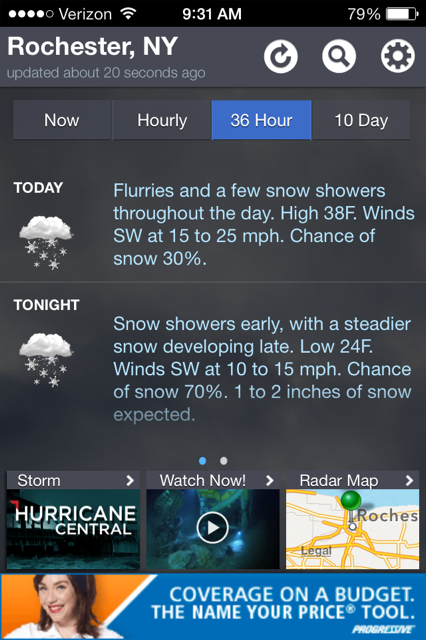Build a great app, destroy 90% of your value proposition
Have you been following the ongoing dispute between satellite TV provider DirectTV and the ubiquitous Weather Channel?
For those not familiar with the story, essentially it boils down to this - when it came time to renew the contract that allows for the Weather Channel to be carried on the satellite service, DirectTV, citing a 20% decline in customer viewership of the Weather Channel, has requested a commensurate decline in the fees it pays to the channel. The Weather Channel, citing, well, things other than actual ratings, is holding out for a (small) increase in carriage fees from DirectTV. While the two sides continue to negotiate and toss barbs at each other, the channel has been taken off DirectTV and has been replaced with an alternate weather information channel.
While these kinds of TV distribution service and content producer disputes kick up from time to time, (there was a pretty widely reported spat between Time Warner Cable and CBS TV a few months ago for example), they have almost always been centered about one thing - costs. Almost invariably, and not surprisingly, the content producers want increased fees from the TV distributors for the right to carry the content/programming. After all they have a compelling argument. No one subscribes to DirectTV for the sheer joy of seeing one of those tiny satellite dishes bolted to the roof of the house. The value is in the content.
But in the DirectTV/Weather Channel spat, DirectTV has introduced another element to the mix, one that serves as a bit of a warning too - that creating an amazing, relevant, easy to use, and distilled to its most important elements mobile app might actually work against the Weather Channel in the long run.
What do I mean by this?
That since the Weather Channel has an incredibly popular mobile app, one that millions of people check everyday, and does not typically get deleted once it has been downloaded, it has in effect, reduced the need for the 'full service', i.e., the TV version of the Weather Channel. Nine or maybe even nine and a half times out of ten the weather information that people need can be and is delivered perfectly capably on their mobile device and within a few seconds. Everyone checks the weather on their phones. And unless there is a major storm or natural disaster type event, the information you get on the phone is a perfectly suitable substitute for watching the actual TV version of the Weather Channel.
Step back a second then and think about what this suggests more broadly. Whether it is a media property like the Weather Channel or a technology solution like an HRIS system or even an organizational entity like an HR department - going down the path of mobile deployment or offering a mobile service element usually means a reduction or a distillation of the offering/value proposition such that it actually works on a mobile device.
And the service or solution has to meet the additional demands of the mobile user - simplicity, speed, ease of use, fun, and most importantly, has to deliver value at that moment.
In the Weather Channel example, their mobile app clearly delivers on those requirements. It is one of the most popular apps across all mobile platforms. And it pretty clearly demonstrates and reinforces the long standing and seems to work everywhere 80/20 rule. Except for the hardcore weather nerds, almost all of the value the Weather Channel creates comes from about 20% of what they do.
The problem now, at least according to DirectTV, is that when you give people the choice to consume only the valuable 20%, well, they don't need, want, or care about the rest of what you do.
I don't have a great big insightful takeaway on this, I just thought the story was interesting.
Mobile-first, or mobile only services certainly don't run into this problem, but for the rest of the world that continues to struggle to squeeze years and years of legacy operations onto a 4-inch screen, I think we will see this scenario playing out more often.
Giving people an amazing mobile experience might be all they need and it might make the rest of what you are doing look and feel kind of old, kind of antiquated, and kind of unnecessary.
Have a great weekend!

 Steve
Steve


